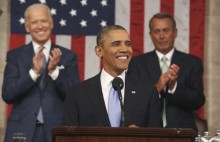It seems that the US leader Barack Obama has decided to revive his presidency, proclaiming 2014 a “year of action” and promising to tackle economic inequality through a number of initiatives to create jobs, increase wages and pensions. To do so, the president intends to rely on his own executive authority without waiting for support from Congress, the legislative branch. This conclusion can be drawn from his annual State of the Union address, which was presented late at night on January 28 to a joint session of the Senate and House of Representatives.
It is true that the Democratic president’s situation is a complex one. Only 43 percent of the population approve the job Obama is doing. This is the lowest rating since his taking the office in 2009. His rivals from the Republican Party are in majority in the House of Representatives. In addition, the Republicans are only six seats short of majority in the upper house, the Senate. It is possible that they will make up this shortfall after this year’s elections.
In his 65-minute speech, the president called the state of the union “strong,” even as he understood that 63 percent of adults say the country is on the wrong track. He described economic progress over six years of his presidency in six short sentences at the start of the speech. In particular, he noted that the US unemployment was the lowest in five years, while the housing market was rebounding. According to him, the country produced more oil than it imported in 2013 for the first time in 20 years, and the government budget deficit has been more than halved. Obama also said that for the first time in over a decade, business leaders around the world had declared that China is no longer the world’s number one place to invest; America is.
However, he admitted also that today, after four years of growth, corporate profits and stock prices have rarely been higher. “But average wages have barely budged. Inequality has deepened. Upward mobility has stalled. The cold, hard fact is that even in the midst of recovery, too many Americans are working more than ever just to get by – let alone get ahead. And too many still aren’t working at all,” Obama stressed.
In his message, the president proposed a number of specific, proposals to accelerate growth, strengthen the middle class and build new opportunities. He remarked that in case of no congressional support, he was going to use executive orders for the implementation of these initiatives.
In particular, Obama announced his intention to increase the minimum hourly pay of federal employees from 7.25 to 10.1 dollars. By the way, Obama made a similar declaration in early 2013, and then abandoned it.
It should be noted that the president’s proposals to Congress are not new. They include closing tax code loopholes, establishing the Foundation for Basic Research, expanding pre-school education, providing student debt relief and stopping attempts to repeal the law on the reform of health care. Many of the details will be fleshed out on March 4 in Obama’s budget message to Congress.
Obama’s major executive orders in 2014 will include the continuation of his policy against deporting the children of illegal immigrants, reducing carbon emissions at existing power plants under the Clean Air Act, supporting new fuel efficiency standards for trucks, as well as the public-private initiative to provide high-speed Internet access for almost all school students over the next four years.
Republicans immediately criticized the president’s focus on executive actions, stressing that it would backfire. “The adoption of regulations without congressional approval does not contribute to the creation of new jobs and will not lead to economic growth,” Senator Jeff Flake said.
Speaking of successes in foreign policy, Obama said that “American diplomacy, backed by the threat of force” forced Syria to give up its chemical weapons. He also said that “American diplomacy, backed by pressure” forced Iran to the negotiating table. However, it should be noted that with regard to Syria and Iran the president is somewhat exaggerating the US diplomacy’s successes. The whole world saw Obama initially drawing a red line before Assad, and then accepting the Russian proposal to destroy Syria’s chemical weapons. But Assad still continues to occupy his country’s presidency, and bloodshed has not stopped.
Clearly, events in Kyiv forced Obama to mention Ukraine with a sentence in his address. The US president said: “In Ukraine, we stand for the principle that all people have the right to express themselves freely and peacefully, and have a say in their country’s future.” By the way, the address did not mention Russia at all. Obama said, though, referring to the successes of American diplomacy that “if John F. Kennedy and Ronald Reagan could negotiate with the Soviet Union, then surely a strong and confident America can negotiate with less powerful adversaries today.”
Meanwhile, the conservatives have criticized Obama’s address, as seen from the headlines of Republican-leaning media. For example, in The National Journal it was “Modest Agenda, Diminished Leader,” in FOX News – “Obama Admits He Is a Loser.” The Huffington Post wrote “Small Ball in Obama Great Hour,” and Commentary stated that “Obama Has Proven That He Cannot Govern.” Even Democrat-leaning newspaper The International New York Times wrote that “executive orders may be an option, but they have limitations.” The headline of article on www.realclearpolitics.com website reads “Modest Proposals, Vow to Act Alone Mark Speech.”








